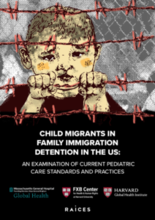The study is the first analysis of the medical records of children as young as six months old and a median age of nine years old detained between June 2018 and October 2020 at Karnes County Family Residential Center in Texas. The report documents evidence of mental and physical harm relating to inadequate and inappropriate medical care experienced by children during prolonged detention.
Executive Summary:
Between 2017 and 2021, more than 650,000 children were taken into custody at the border, with more than 220,000 of these children being detained for more than 72 hours and many transferred with their families to Immigration and Customs Enforcement (ICE) detention facilities.
Our study, a review of 165 medical records of children in an ICE family immigration detention facility at Karnes County Family Residential Center in Karnes City, Texas between June 2018 and October 2020, documents evidence of the mental and physical harm relating to inadequate and inappropriate medical care experienced by children during prolonged detention.
The study was performed by researchers based at the Massachusetts General Hospital (MGH) Asylum Clinic at the MGH Center for Global Health and the FXB Center for Health and Human Rights at Harvard University in collaboration with the Refugee and Immigrant Center for Education and Legal Services (RAICES). Medical records were fully de-identified, meaning any patient names, personal identifiers and dates of health care visits were redacted, before being made available to the research team. Ethical review was completed by the Mass General Brigham Institutional Review Board.
Key findings include the prolonged length of detention for children, a median duration of 43 days with 88 percent of children remaining in detention for longer than 20 days, the maximum limit of detention for children under the terms of the Flores Settlement Agreement. There was inadequate supervision and documentation of acute medical care, and inappropriate screening and follow-up care for existing chronic medical conditions, malnutrition, and tuberculosis. Screening for mental distress was inappropriate leading to the under-recognition of children at risk for mental health disorders. The same non-validated tool for screening for mental distress was used for children 6 months to 18 years old.
The evidence of this study demonstrates that immigration detention harms children’s mental and physical health at a crucial time of physical, mental, and social development. This evidence supports a conclusion that detention, in any form, is never in the best interest of children and the detention of children must end. This conclusion is in line with the policy and statements of the American Academy of Pediatrics, the American Academy of Child and Adolescent Psychiatry, the National Association of Social Workers, and numerous other professional societies. A Policy Statement by the American Academy of Pediatrics states, “Children, especially those who have been exposed to trauma and violence, should not be placed in settings that do not meet basic standards for children’s physical and mental health and that expose children to additional risk, fear, and trauma.”
The Biden administration paused the use of ICE family immigration detention in 2021, however, detention and residential care of children continue to occur during Customs and Border Patrol processing and for children in custody of the Office of Refugee Resettlement. There have been documented cases of harm and even the death of children in these settings and there is current policy consideration for the reinstatement of family immigration detention. The findings and recommendations in this report should be considered in any policy, current or future, involving the detention of migrant children in the United States. As long as child detention continues to exist in any form, children must be afforded one of the most basic of human rights, adequate medical care, and oversight must be in place to ensure this responsibility is met.

